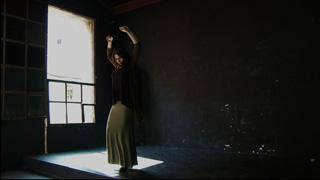Bajarí, Gypsy Barcelona
Bajarí SPAIN / 2012 / Spanish / Color / Blu-ray / 84 min
SPAIN / 2012 / Spanish / Color / Blu-ray / 84 min
Director, Script: Eva Vila
Photography: Joan Tisminetzky
Editing: Ernest Blasi, Núria Esquerra, Victor Kossakovsky
Art Director: Cándido Álvarez
Line Producer: Mariona Claveria
Sound Design: Juan Sánchez
Direct Sound: Natxo Ortúzar, Francesc Gosalves, Marcos Casademunt
Associate Producer: Eva Cebrián
Executive Producers: Jordi Ambrós, Jordi Balló
Producers: Tono Folguera, Oriol Ivern
Production Company and World Sales: Lastor Media www.lastormedia.com
What meaning does flamenco have for the gypsies of Barcelona? The niece of a traditional dancer, Karime Amaya transfixes her audiences as she demonstrations her peerless footwork on stage. And though Juanito Manzano may still be young, his movements are lithe and agile. He is a popular figure who catches the attention of people relaxing on street corners. The flamenco tradition is the pride of Barcelona, a practice passed down carefully from generation to generation with a severe, but warm gaze.
[Director’s Statement] While shooting my previous documentary B-Side, my crew and I discovered an unseen community formed by musicians of distinct origins who shared only one thing in common—their strong belief in music as a lifestyle. This faith gave them a sense of belonging to a worldwide community, one of musicians.
Our next film, Bajarí, peels back the layers of this sense of belonging to a concrete community, focusing on the Catalan gypsies who everyone has heard of, but who many feel are like ghosts. Not many people know that the Barcelona of the Gypsies, “Bajarí,” is still alive in the streets of this city.
Nowadays, few know that Bajarí is the Gypsy name for the city of Barcelona, and that one can unveil another reality under Barcelona’s layers of tracks, one very different from the image most visitors and citizens have of the city. Bajarí is a city that has existed for many years and yet remains the same—despite some changes over time—because its soul, its identity, is an inherited art form and their performers will not let it die.
With this film, we sought out Bajarí as it exists here and now, and found a story about the universal sense of belonging. Karime Amaya left her life in Mexico in order to discover the artistic gene that has turned her into what she is today—a dancer of international standing. Five-year-old Juanito Manzano’s journey starts with the wayward wish to be a dancer within the Gypsy community where he was born. Karime and Juanito’s are two journeys of personal discovery that unfold within the landscape of the Flamenco and Rumba worlds of Barcelona.
There is probably no other art form in which it is so important to be “a child of” and to transmit who you are through the most natural expression of your culture, your art, and your inheritance. Bajarí sings the joy of living, following the trail of mythical films like Buñuel’s The Forgotten. It is a joy that is born of knowing you are a part of something, of being so close to these origins that are now blurred by our modern society.
 Eva Vila
Eva Vila
Director and writer, born in Barcelona in 1975. Eva Vila’s first feature film, B-Side (2008) was screened at several festivals worldwide. A trained musician with a Master’s in Art Critique, Vila seeks symbiosis between cinema and other arts to create audiovisual pieces like Personal Space (2009), a portrait of the Catalan composer Josep Soler. She has coordinated the Master’s program in Creative Documentary at the University Pompeu Fabra in Barcelona since 2003, where she has worked alongside renowned documentary filmmakers like Joaquim Jordà and José Luis Guerín.
